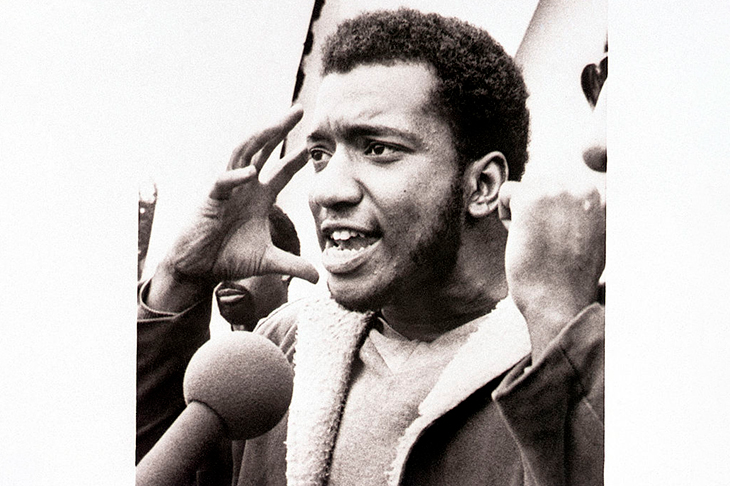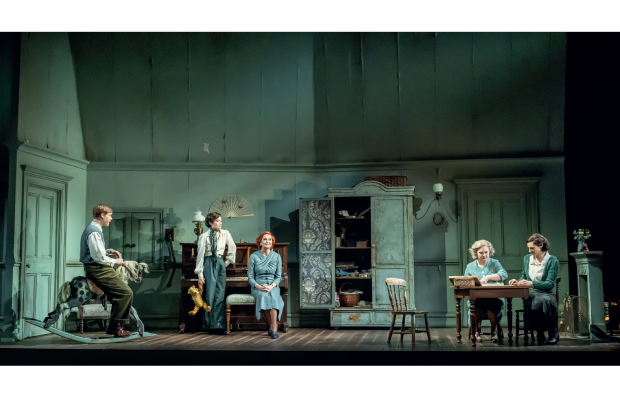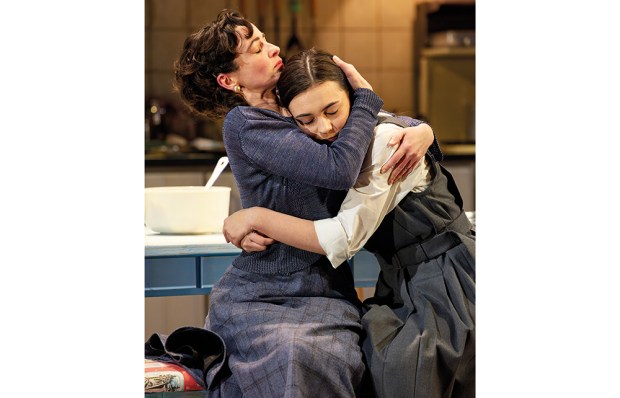I’ve joined the Black Panthers. At least I think I have. I took part in an induction ceremony at the start of Messiah at Stratford Circus. ‘Stand up,’ said the actor Shaq B. Grant to the predominantly white crowd. ‘Raise your right fist and repeat after me: “I am a revolutionary.”’ Everyone obeyed and chanted his mantra, some with more sincerity than others. Then the show began.
The subject is a notorious police raid on a Panther hideout in Chicago in 1969 which resulted in the death of Fred Hampton, a 21-year-old activist nicknamed ‘the Black Messiah’. The police alleged that the Panthers opened fire first. The Panthers claimed that Hampton sustained survivable wounds during the raid and was later executed by unnamed police officers. These controversies are examined in the play, which was ‘devised by Bear Trap Theatre’ using a script co-written by Jesse Briton and Paula B. Stanic.
It seems that many hands — perhaps too many — were involved in creating a show that encompasses several incompatible genres. It opens as a reconstruction of the police raid undertaken by a TV news show. It then morphs into a documentary about the lives of Hampton and his pregnant girlfriend before the shoot-out occurred. But this duality means that the set has to double as the real house and as the reconstruction in the studio. The chronology jumps between deeds that took place before the raid, during the raid, and afterwards on TV. In addition we watch fragments of historical exposition, a comic sketch about idiotic white people and a bizarre passage of dialogue (whose location is uncertain) in which Martin Luther King’s spirit interrogates a Chicago cop.
Towards the end, the play becomes a spy thriller about a mole within the Panther movement who passed data to the police without which the raid could not have occurred. Despite its chaotically wonky structure the show delivers some fascinating data and excellent comedy. Understandably, it takes an uncritical view of Hampton’s political creed. He was a Marxist who wanted the fabric of American society torn down and rebuilt from scratch. While rejecting capitalism he also demanded that private assets — land and food — be handed over to black Americans for them to use on a commercial basis. This contradiction isn’t addressed. He rejected the idea that ‘black capitalism’ might redistribute wealth and opportunity more swiftly than any other mechanism, but with hindsight it seems he got that wrong.
Hampton was admired by his community for establishing food banks and free health clinics, and he was credited with brokering peace deals between street gangs. But the play casts suspicion on his status as a pacifist by revealing that he kept an arsenal of weapons in his bedroom. Hampton would doubtless claim that the guns were intended for self-defence, and the likelihood that he was murdered lends merit to that argument. Most interesting are the two scenes of fantasy. We see Martin Luther King berating a police sergeant who was involved in the raid and their interview ends with the cop spitting in his interlocutor’s face. This presents a rather distorted picture of America’s official attitude to Dr King whose name is honoured with an annual holiday in the US.
There’s a hilarious piece of vaudeville in which white suburban males are pilloried as stay-at-home pansies easily dominated by their priggish and sexually inert womenfolk. This hilarious and blatantly racist sketch won roars of mirth from the crowd, especially the whites. The blacks seemed a little less comfortable with it. But the uneven distribution of laughter should worry anyone who believes a black uprising might be possible. More than 50 years after the Panthers were founded, white people are still so secure in their wealth and power that they can lead the laughter as minorities attempt to mock them.
Dick Whittington is a pest-control panto by Robert Hyman and David Watson. Dick arrives in London during a rat infestation and finds a job at Lady Lush’s ice-cream parlour. Her ladyship has turned the influx of vermin to her advantage by adding rodents’ blood to her products. This appears not to hurt sales. Dick’s mission is to purge the city of rodents by marrying a mousy-looking female who is the secret spawn of King Rat and another significant character. The story carries traces of some primal myth about corrupted fertility.
John Haidar’s handsome production stars Vedi Roy as a quietly camp Lady Lush. Bree Smith does a fine turn as a curmudgeonly Caribbean granny addicted to home-grown turnips. The charm and innocence of Sèverine Howell-Meri (Dick) would catch the eye of any casting director. With the election looming, I was expecting political gags aplenty but there were none apart from a sole reference to Brexit. This was greeted with a painful gasp of anger and frustration. It sounded like the tortured howl of a brutalised people pleading for release.
Got something to add? Join the discussion and comment below.
Get 10 issues for just $10
Subscribe to The Spectator Australia today for the next 10 magazine issues, plus full online access, for just $10.
You might disagree with half of it, but you’ll enjoy reading all of it. Try your first month for free, then just $2 a week for the remainder of your first year.














Comments
Don't miss out
Join the conversation with other Spectator Australia readers. Subscribe to leave a comment.
SUBSCRIBEAlready a subscriber? Log in